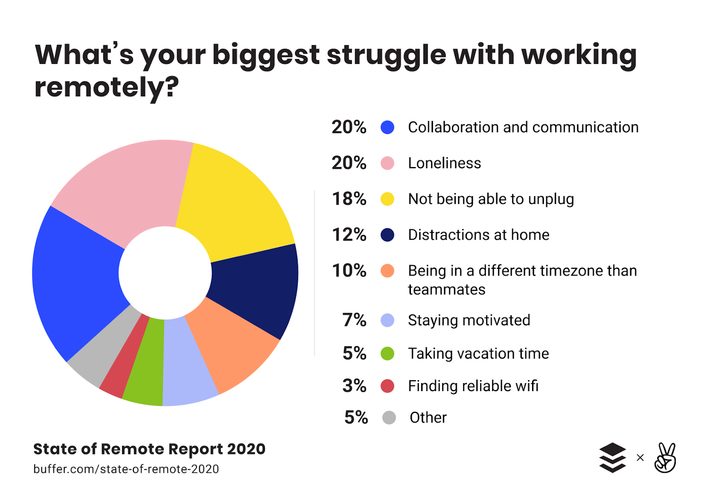
The concept of remote work was alien to almost every professional until March 2020 when the World Health Organization declared COVID-19 a deadly pandemic.
After the severity of the situation increased, every organization, every professional had to adapt to remote working mandatorily as the governments across the world announced complete lockdowns and major restrictions on the movement.
With no prior experience and understanding of how remote work is carried out at scale, organizations, business leaders, HR leaders, senior and mid-level managers, as well as executive-level staff struggled to find the right spot between communication, executive, and innovation.
The first half of 2020 was a learning curve for everyone while they accepted and understood the work from home reality, and adapted accordingly. But 2021 is definitely the year where new norms of working are getting defined and remote working is going to play a really big part. According to a survey done by Tecla, 85% of managers believe that teams with remote work will become the future of work.
The future we envision for work allows for infinite virtual workspaces that will unlock social and economic opportunities for people regardless of barriers like physical location. It will take time to get there, and we continue to build toward this. Andrew Bosworth, VP Facebook Reality Labs
Since remote work is the future, every manager should know the nuances, best practices, and strategies of managing a remote team which is what we are going to discuss in this article.
[Tried & Tested] Tips & Strategies to Manage a Remote Team in 2021
All the strategies and tips listed below to manage a remote team are based on the biggest struggles of working remotely.

[Source: Buffer]
Communicate All the Kinks Out
Its easier to communicate but its the hardest to communicate clearly and effectively. The better the communication, the easier it will be for you to set expectations, communicate deadlines and project specifics.
Use deliberate and structured communication whenever communicating with your team members. If possible, have weekly work meetings on Mondays to set goals for the week and then a sort of debriefing and fun meetings on Fridays for catching up, understanding progress on projects, weekend plans, etc. This way, you hit the sweet spot between formal, productive, and informal communication.
Also, the key to successfully conducting these meetings is video calls, so always make sure your team is switching their videos on and proactively participating in conversations. To be more effective, invest time in your team members – have a habit of conducting 1-1 meetings with them on a regular basis to understand how they are doing.
“Technology now allows people to connect anytime, anywhere, to anyone in the world, from almost any device. This is dramatically changing the way people work, facilitating 24/7 collaboration with colleagues who are dispersed across time zones, countries, and continents.” Michael Dell, Dell
Establish Complete Feedback Loops
Having feedback loops is quite important for remote teams since everyone is working remotely and in different time zones.
Establishing a feedback culture will help you provide support to your team members at an individual level, identify pain areas in operations, stay ahead of any potential conflict, and build meaningful relationships. All this will help improve your teams overall performance.
Tips on How to Build Feedback Culture
- Make it a part of your process from day 1
- Create a safe environment for your team to express their feedback and concerns openly
- Train your team to give receive feedback – it is essentially a skill
- Use different feedback channels like 1-on-1 meetings, 360 feedback, anonymous feedback, etc.
Boundaries are Productive
After working from home for over a year, all of us have realized that the lines between work life and personal life can easily get blurred when you are working from home. So, its important to set some healthy boundaries for all your remote team members to avoid extra, unnecessary stress, and burnout.
For example, recently, Bumble – a dating app company, announced a week-long holiday for all their employees to avoid burnout.
A Few Ways to Go About Setting Boundaries
- Limit availability
- Ask them to avoid connecting their professional accounts on their personal devices
- Encourage wellness and self-care activities like mindful meditation breaks
- Share about personal interests and hobbies or any other non-work talks to keep it light
- Most importantly, dont schedule too many meetings
Invest in Right Tools & Technologies
Since all of your team members are scattered across different cities, countries, and even continents, it becomes imperative to invest in the right tools and technologies that enable effective timely collaboration.
Things to Keep in Mind While Choosing Tools for Your Team
- Consider all the use cases and then hunt for the right product.
Choose future-proof tools that enable digital transformation for your organization. For example, if you were planning to invest in SaaS tools that enhance customer experience, then instead of going for software that enables better communication between your team and customers, invest in software that adds to their experience directly like a product tour software for customers onboarding.
Here are some product tour examples and a guide on how to make the most out of such software.
- Review your process and needs and then choose accordingly
- Do your research, thoroughly
- Get the tools customized, if needed
- Pick the tools that allow you to create an integrated ecosystem
- Train your team
“The whole conversation is about how remote work is different, instead of being about the amazing tools we have at our disposal that remote teams and non-remote teams are able to use at any time. We have this opportunity to have a lot more freedom in our environment compared to when we had to be in an office, or even in school, 40 hours per week.” Hiten Shah, FYI
Mandatory Monthly or Quarterly Holidays
If your team members havent opted for any holidays in the last few months, then make sure they take holidays, mandatorily. Just because we all are working from home and cant travel, for the time being, doesnt mean we dont need holidays.
So make sure to keep an eye out for your team by encouraging them to time off even if they think they dont need it.
Lastly, Acknowledge & Celebrate Milestones and Hard Work
Celebrating achievements and milestones is quite necessary to keep everyone motivated. Before remote working became the norm, it used to be easy to gather everyone and celebrate individual achievements, company-wide milestones. But when everyone is working from their own spaces, celebrating achievements gets forgotten easily.
So, make sure to make it a habit to celebrate and acknowledge your team members whenever they are due.
Now that companies have built the framework and experienced the cost and time savings associated with it theres no real reason to turn back. Mark Lobosco
